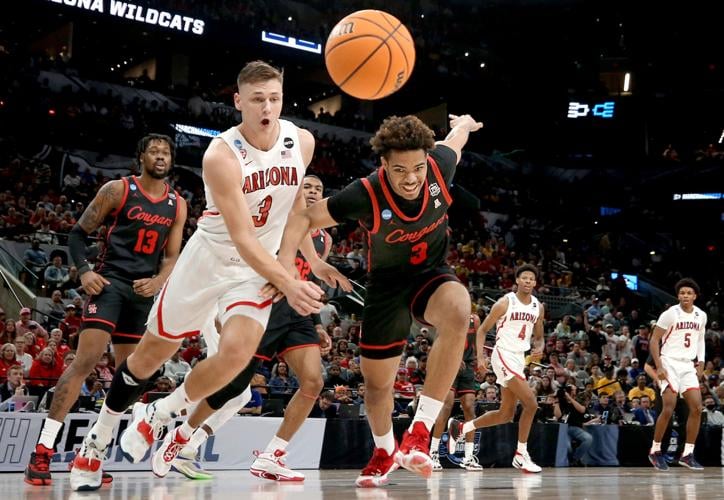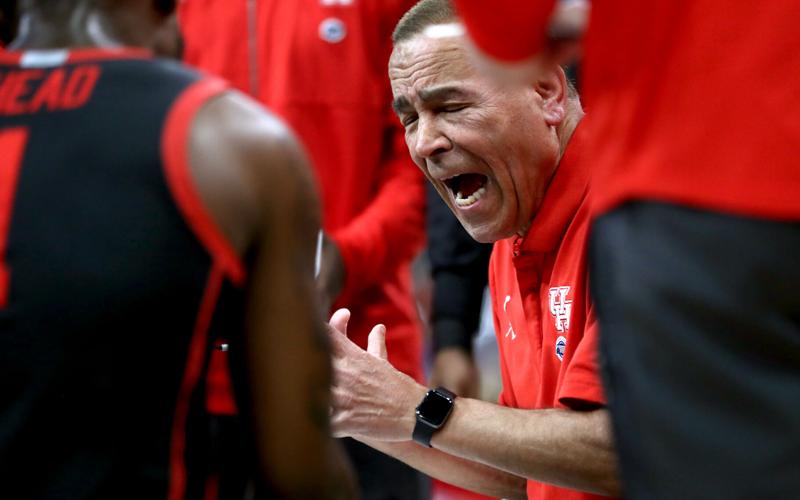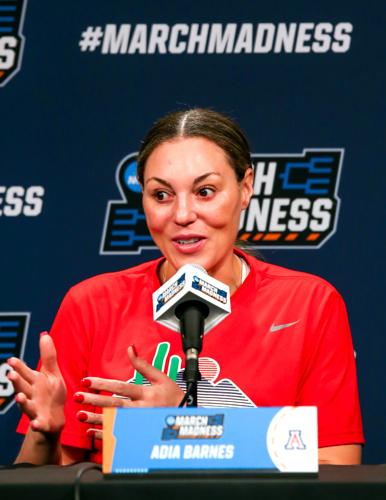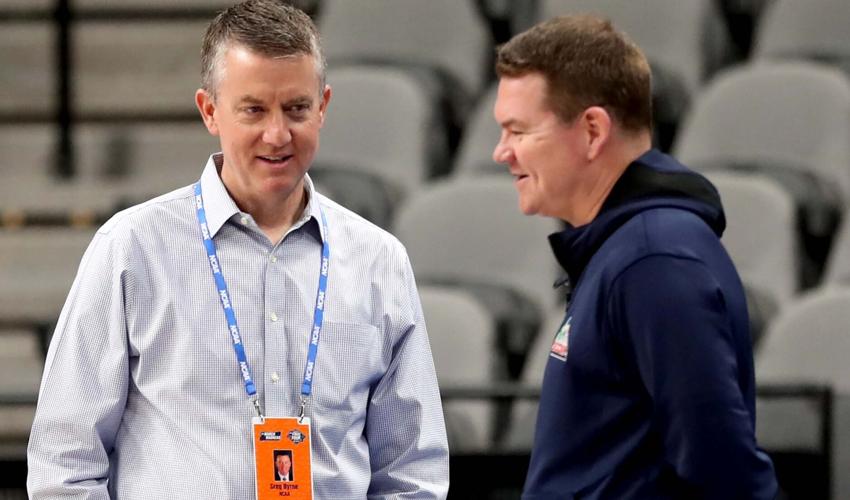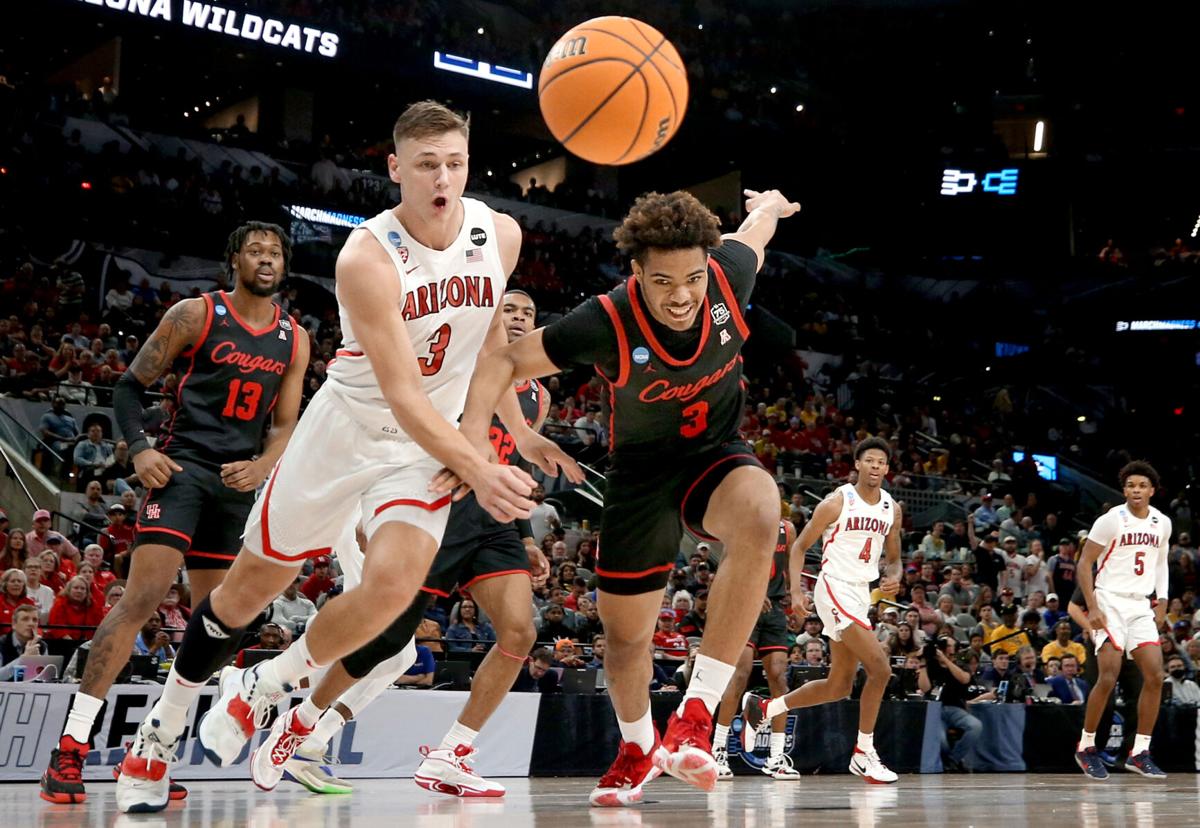The Star's longtime columnist on what made Houston so tough in Thursday's Sweet 16 game, why Adia Barnes is against neutral-site NCAA Tournament games, and how Adidas' new Name, Image and Likeness plan is the height of hypocrisy.
Experience — and defense — were key for Houston in Sweet 16 win over Wildcats
Houston coach Kelvin Sampson was 0-15 against Arizona during his time as Washington State’s head coach, 1987-94, but since leaving the Pac-12 his teams at Oklahoma and Houston have eliminated the Wildcats in the 1999, 2002 and 2022 NCAA Tournaments.
He’s as much, or more, a Wildcat-killer than anyone from Wisconsin or anywhere.
What happened? Sampson got access to better players once he left WSU. But the 66-year-old Sampson became a more capable coach, which doesn’t always happen. His victory over Arizona at Thursday’s Elite Eight was the 698th of his career, which puts him ninth among all active coaches.
By comparison, Tommy Lloyd has coached 37 games. When Sampson was Lloyd’s age, 47, Sampson coached Oklahoma to the 2002 Final Four, including that win over the Lute Olson-Luke Walton Sweet 16 team. It was Sampson’s 15th year as a head coach.
With that perspective, Lloyd’s first season at Arizona grows in potentiality. If he sticks with it for 15 years, at Arizona or elsewhere, Lloyd seems to have the right stuff to eventually get to the Final Four.

Houston coach Kelvin Sampson gets his pint across during a timeout in the first half of Thursday's NCAA Tournament game.
Last week, Sampson used two words — "get old" — to describe his remarkable five-year run at Houston and it had nothing to do with his age. It had to do with assembling teams led by juniors and seniors. The Cougar team that beat Arizona last week started three grad transfers and one junior and averaged 2.25 years of experience.
By comparison, according to KenPom.com rankings, Arizona averaged 0.52 years of experience, which ranks No. 355 of 358 Division I teams.
In modern college basketball, roster management and roster turnover dominate Top 25 basketball. Sampson is one of the few coaches who has chosen — or been forced — to play with non-NBA prospects. Guess what? It works, as long as you teach defense and toughness first, at which Houston excels.
A skilled communicator, a visit to a Sampson coaching clinic should be on the list of all young coaches. What he learned at WSU, Oklahoma, Indiana and for six years as an NBA assistant coach is invaluable wisdom.
At the Sweet 16 last week in San Antonio, Sampson talked about the difficulty that comes with recruiting elite players.
"The hardest thing in basketball is to teach defense," he said. "When kids come in, they don’t come to school to be good on defense. They come to school to get the biscuit in the basket. They’re like, ‘Coach, don’t mess with my game.'"
Sampson messes with their game.
Houston beat Arizona with defense and toughness, which you usually don’t find at the elite preps schools or the big-money Nike and Adidas summer camps. ESPN analyst Jay Bilas described Houston as "maybe the toughest team in America; tough as nails — mentally, physically, you name it."
Arizona deploys fewer and fewer "tough as nails" players as the years pass. So do most Top-25 programs, who have given way to one-and-done and two-and-gone players interested mostly in getting their shots. Oh, what Lloyd could do with a latter-day roster of Arizona’s most effective "tough as nails" players of the last 30 years: Chris Mills, Ben Davis, Michael Wright, T.J. McConnell, Jud Buechler and Nick Johnson.
All of those Wildcats became first-team all-conference players who spent time in the NBA.
Arizona needs to get older and tougher. It needs to play more effective and tenacious defense. That’s easier said than done, right? But if the Wildcats can profit by anything from their Sweet 16 loss, it would be to learn from Kelvin Sampson, who quietly has become one of the most successful coaches in college basketball history.

Arizona Wildcats head coach Adia Barnes speaks during a press conference as Arizona prepares for round two of the NCAA Women's Basketball Tournament hosted at McKale Center, 1721 E. Enke Dr., in Tucson, Ariz. on March 20, 2022.
Adia Barnes against neutral-site NCAAs
Arizona drew 17,906 fans for last week’s NCAA Tournament games against UNLV and North Carolina, the second-highest total of the 16 first-round host schools.
At the same time, the NCAA announced that 216,890 attended first weekend games, a record for the women’s tournament. It led some, including Oregon coach Kelly Graves, whose team was bypassed as a host school, to advocate for an all-neutral site tournament.
Arizona coach Adia Barnes’ reaction: "Absolutely not."
"I think that's a terrible idea for our game. I don't agree with that at all," she said after Monday’s loss to the Tar Heels. "I think on the list of 100 things to change, to me, that's 100. I think there's so many things to change before that with equity and stuff that that's not even a consideration for me or not even on the list."
Imagine if the Arizona-UNLV and Arizona-North Carolina games had been played, for example, at a neutral site in California or Georgia, or anywhere. Total attendance would’ve been fortunate to reach 4,000.
"I think (home court hosts) are more valuable in our game because it's different," said Barnes. "I think it's more valuable to play in McKale with 10,000 people than it is to go to San Antonio to a neutral site with 1,500 people. I think that makes no sense. I don't think it generates any income, and I don't think it's good for our game where we are right now."
In the Pac-12, only Arizona, Oregon State and Oregon draw enough fans in women’s basketball to even consider bidding to be a host site. National powerhouse Stanford, the No. 2 overall seed drew small crowds of 3,618 and 4,189 for its first-round weekend wins over Montana State and Kansas, about 52% capacity at Maples Pavilion.
I’m on the record predicting the NCAA will move to an all-neutral court women’s basketball tournament about 2025. Either way, it seems inevitable the issue will be brought up again.

Former Arizona athletic director Greg Byrne chats with UA coach Tommy Lloyd just before Wednesday's practice in San Antonio.
Ex-UA AD Greg Byrne front and center at tourney
Former Arizona athletic director Greg Byrne is in his first of five years as part of the NCAA men’s basketball tournament selection committee. It’s one of the most high-profile assignments in college sports. The Alabama AD was in San Antonio representing the NCAA last week. "It takes a lot of time and there’s so much to learn about each team," he said. "It’s a five-year term, so a big commitment but I’m fortunate to have been asked." The Pac-12 rep is UCLA’s new AD Martin Jarmond, who was at the UA-TCU site in San Diego. Jarmond went to Philadelphia for UCLA’s Sweet 16 participation this weekend. Byrne’s addition to the selection committee continues an impressive Arizona connection. Former UA athletic directors Cedric Dempsey and Jim Livengood both were chairman of the selection committee, Dempsey in 1988 and Livengood in 2003.
Beginning his fifth year at Alabama this month, Byrne, who is only 50, is paid a base salary of $1.38 million under a contract that peaks at $1.54 million in 2026. Compare that to Arizona’s Dave Heeke and ASU’s Ray Anderson. Heeke is on track to receive a contract extension through March 2025 that would boost his base salary to $875,000. Heeke’s base pay would rise to $885,000 in 2023-24 and $895,000 in 2024-25. He would also continue to receive a $100,000 annual retention bonus. ASU’s Anderson is in the second year of a contract that will run through February 2026. Anderson’s annual salary will rise to $950,000 in that period. He would also receive a $500,000 bonus upon the execution of the extension. The highest-paid Pac-12 athletic director at a public university is Colorado’s Rick George, whose base salary is $1 million with a deal that runs through June 2026.
Tucson ref continues postseason streak
Tucson basketball referee Bob Scofield worked last week’s women’s NCAA Tournament games in Louisville, which is the 23rd straight season, dating to 1999, that Scofield has been selected, on merit, to officiate the women’s NCAA games. Tucsonan Chris Rastatter worked Friday’s historic Sweet 16 game in which 15th seed St. Peter's stunned No. 3 seed Purdue.. According to the kenpom.com referee rankings, Rastatter has the second-highest ranking of all full-time Pac-12 officials, No. 18 overall, behind No 15 Tony Padilla.
Ex-Badger John Felix dies at 68
Sad to hear that John Felix, starting outfielder for Tucson High’s historic 25-0 state championship baseball team of 1972, died last week. He was 68. Felix’s sixth-inning, run-scoring single in the ’72 state title game against Scottsdale Coronado tied the game, allowing the Badgers a chance to win in nine innings. That ’72 team, coached by Ray Adkins, included Ron Hassey, Mike Odum, Al Lopez and Frank Castro, four of the top names in Tucson prep baseball history. Sadly, Lopez also died recently, in Texas. Felix was a service tech at Southwest Gas for 27 years before retiring. A celebration of his life will be held Sunday at 2 p.m. at Sacred Heart Parish, 601 S. Fort Lowell Road.
Ex-Cat Jacob Berry stays hot at LSU
Jacob Berry, a freshman All-American designated hitter at Arizona who transferred to LSU to be with ex-Wildcat baseball coach Jay Johnson, has been just as effective as a Tiger sophomore as he was at Arizona in 2021. Berry was batting .356 with an SEC-high eight home runs through Friday. At LSU, Berry has played third base and the outfield, which is likely to improve his draft stock. He was strictly a DH at Arizona, where he hit .352 with a freshman-record 17 home runs last season.
Sean Miller talks joy, balance in presser
I watched Sean Miller’s 21-minute welcome-back-to-Xavier press conference Friday and was struck by one thing. He said he has found more balance in his life since being fired at Arizona. "You have to find time for joy," he said. Miller smiled a lot, which was not his look in Tucson. When Xavier AD Greg Christopher announced the hiring of Miller last week, he said "We are confident that Sean will be an even better coach having weathered the storm at Arizona." That’s a bit off. Miller was the storm at Arizona. But at 53, he has time to change paths and enjoy the ride in his return to Xavier rather than let the job consume him.
My two cents: Adidas' NIL plan is the height of hyprocrisy
Adidas last week announced it will create a name, image and likeness (NIL) network for up to 50,000 college athletes to become paid endorsers of the brand. During a 2017 and 2018 FBI investigation, Adidas was mentioned in impermissible payments to top college basketball recruits. Now it’s all legal.
The Adidas-NIL news didn’t sit well with former Arizona assistant coach Book Richardson, who is now a club basketball coach in New York. Richardson was fired by Arizona and spent three months in prison for his part in illegal payments to college recruits.
In an interview with Sportico, Richardson said: “I went to jail for this. I have a felony, I can’t do what I love. My passion was taken away. I lost my family, my career, my house, my everything — and now, in five years it went to ‘I am going to pay you on the books officially for your NIL.’"
And yet the whole mess is not final. The dawdling Independent Arbitration Resolution Process has yet to announce a decision regarding Arizona’s basketball program.
The price has been paid, in full and more, by Richardson. Any further penalty to Arizona would be excessive.


